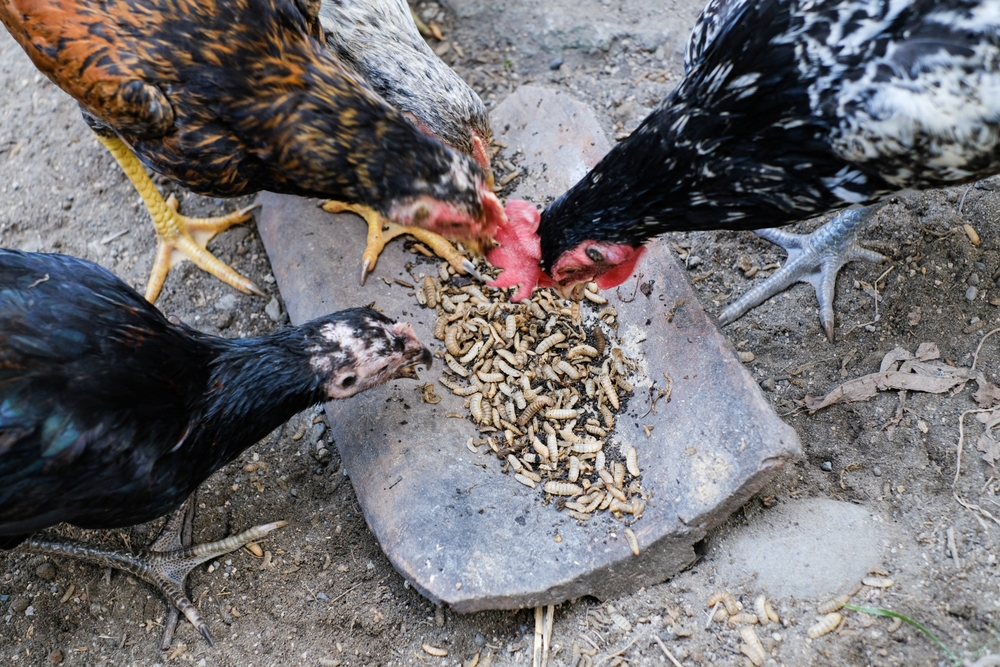As the global demand for chicken meat continues to rise, the poultry industry faces mounting challenges related to sustainability, feed costs, and animal welfare. Traditional feed ingredients, particularly soybean meal, contribute significantly to environmental degradation. In this context, Black Soldier Fly (BSF) larvae emerge as a promising alternative, offering nutritional benefits for chickens and a more sustainable solution for the industry.
Main Challenges of Traditional Chicken Feed
Traditional poultry feed relies heavily on various protein sources, each with specific advantages and significant drawbacks. Soybean meal is the most common due to its high protein content and widespread availability, yet it contributes significantly to deforestation and greenhouse gas emissions.
Fishmeal, considered nutritionally superior, faces sustainability issues due to overfishing and contamination risks. Other options like corn gluten, canola meal, sunflower meal, meat and bone meal, and legumes offer cost-effective alternatives but often require supplementation or processing due to nutritional imbalances or antinutritional factors.
Overall, conventional protein ingredients present considerable environmental footprint as well as nutritional and economic challenges, pushing the poultry industry to seek sustainable and balanced alternatives such as insect-based proteins like Black Soldier Fly larvae.
Fishmeal – The Gold Standard
Fishmeal, derived from fish processing by-products or whole small fish, is a highly nutritious feed ingredient traditionally considered the gold standard of poultry nutrition. It is rich in essential amino acids, omega-3 fatty acids, vitamins, and minerals. However, fishmeal use has significant drawbacks, such as:
- High cost due to limited supply and increasing global demand.
- Environmental concerns from overfishing and marine ecosystem disruptions.
- Risk of contaminants, such as heavy metals and toxins, if poorly sourced.
Nutritional Advantages of Black Soldier Fly Larvae
SF larvae are rich in essential nutrients, making them an excellent alternative protein source for poultry. They contain high levels of crude protein, often between 35-45% on a dry matter basis, and are abundant in essential amino acids such as lysine, threonine, and methionine, which are crucial for the growth and health of broiler chickens.
Additionally, BSF larvae provide significant amounts of energy, essential fatty acids, and minerals like copper, iron, and zinc, contributing to the overall nutritional profile required for optimal poultry development.
BSF larvae can also be fed live to chickens, generating a double value: replacing 5-10% of the feed with live larvae can improve feed conversion rate, enable to reduce the protein content in the dry formulated feed, and contribute to chicken walfare. On the other hand, the larvae are grown by converting local food waste into animal feed, contributing to more local and circular feed consumptions, and if grown on farm also to reduced feed expense.
Impact on Chicken Health and Performance
Incorporating BSF larvae into poultry diets has shown positive effects on chicken health and growth.
Studies indicate that broilers fed diets containing BSF larvae exhibit improved weight gain, feed conversion ratios, and immune responses. Additionally, BSF larvae meal has been associated with a healthier gut microbiota, reducing harmful bacteria and promoting beneficial ones.
Feeding broilers with black soldier fly larvae meal (BSFLM) of up to 10% reduced heat stress and pathogenic intestinal bacteria count. Replacing soybean meal with BSFLM improved broiler performance and potentially reduced immune response energy expenditure in birds fed 20% BSFLM
BSF Larvae in Diets for Laying Hens: Enhancing Egg Production and Hen Health
Recent research underscores the potential of incorporating Black Soldier Fly (BSF) larvae into the diets of laying hens, offering benefits for both egg production. Furthermore, feeding live BSF larvae was associated with increased gut microbiota diversity in laying hens. Such diversity is linked to improved gut health and a stronger immune system, suggesting that BSF larvae not only support production metrics but also bolster the overall well-being of the hens.
A meta-analysis encompassing 24 studies from 17 countries revealed that BSF larvae meal supplementation significantly improved feed efficiency, enhanced egg quality parameters like Haugh units and albumen quality, and positively influenced blood lipid profiles in laying hens. Furthermore, including BSF larvae meal in laying hen diets also improved yolk color and maintained egg production levels during the overall laying period.
In another study where hens were provided with varying amounts of live BSF larvae, those with ad libitum access consumed fewer traditional feed concentrates and exhibited greater weight gain. Importantly, egg production and quality metrics remained consistent across all groups, indicating that BSF larvae can effectively supplement conventional feeds without compromising productivity.
Collectively, these findings highlight the viability of BSF larvae as a sustainable and health-promoting component in the diets of laying hens, aligning with industry goals for enhanced productivity and animal welfare.
Economic and Environmental Benefits
Incorporating BSF larvae into chicken feed formulations can lead to substantial cost savings by partially replacing ingredients like soybean and fish meals.
BSF larvae can be reared on organic waste streams, offering a sustainable method to convert low-value waste into high-value protein. This not only reduces feed costs but also addresses environmental concerns by minimizing waste and lowering the carbon footprint associated with traditional feed production. The ability of BSF larvae to efficiently convert organic waste into biomass positions them as a viable solution for sustainable and cost-effective poultry feeding strategies.
Conclusion
As the poultry industry navigates rising global demand, environmental pressures, and economic uncertainties, adopting innovative and sustainable practices becomes essential. Black Soldier Fly larvae represent not just an alternative protein source but a significant step forward in creating resilient and responsible poultry systems. Whether improving the health and productivity of broilers, enhancing egg quality in laying hens, or reducing the industry’s environmental footprint, the BSF advantage is clear. Embracing insects in chicken feed isn’t merely an option—it’s a forward-thinking solution essential for the future of poultry production.
